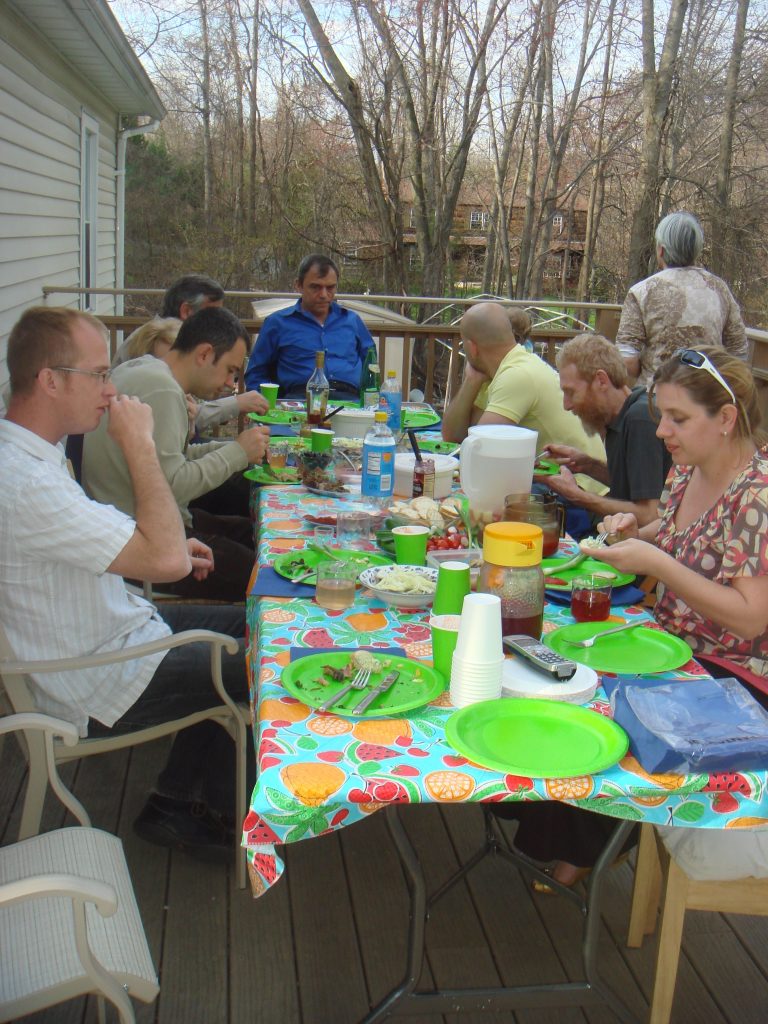Summer Weekends, Russian Style Posted by yelena on Jun 23, 2010 in language, Russian life, Traditions
 I’m going to let you in on a secret… Move closer to the screen… Closer… Even though we just posted our guest blogger invite, we (Josefina and I) have been mulling over this idea for some time. We just needed a willing test subject (aka a guinea pig). Somehow our choice fell on Vicki, quite possibly because of the funny comments she left on a couple of our posts (told ya, we really read them). To make a long story short, we asked Vicki to guest post for us and she graciously agreed, possibly because we didn’t mention anything about this being a test.
I’m going to let you in on a secret… Move closer to the screen… Closer… Even though we just posted our guest blogger invite, we (Josefina and I) have been mulling over this idea for some time. We just needed a willing test subject (aka a guinea pig). Somehow our choice fell on Vicki, quite possibly because of the funny comments she left on a couple of our posts (told ya, we really read them). To make a long story short, we asked Vicki to guest post for us and she graciously agreed, possibly because we didn’t mention anything about this being a test.
So without further delay, let me introduce Vicki Boykis:
Born in Nizhniy Novgorod, Vicki moved to the US at the tender age of 5. Amazingly, she didn’t stop speaking Russian! She currently lives and works in Washington, D.C and finds time to blog on her very entertaining blog. You can also follow her on Twitter @vboykis.
And now, in Vicki’s own words:
«Чем занимаются русские иммигранты летом в Америке?» [What do Russian immigrants do in the summer in the US?]
Josefina and Yelena do an excellent job writing about what it’s like to live in Russia, so for this guest post, I thought I’d move a bit closer to (my) home, the Northeastern United States. It contains a lot of pidgin Russian words (italicized) that Russian immigrants in the United States use…see if you can figure them out phonetically.
In Russia, summer is often a time to be spent at the «дача» [dacha], «собирая ягоды и наслаждаясь урожаем» [picking berries and enjoying the harvest] and drinking cold beer. Tragically, Russians who live «в иммиграции» [in immigration] and not in «Рашка», but either in the USA, Canada, Australia, or other countries, don’t have the chance to partake in this tradition because summer homes are quite expensive and in America might require a second «моргедж».
Often, summers in the United States revolve around «шашлык» (shashlik, shish-kebab) with friends and family. Usually, the family will pile into a car in order to «драйвать» on the «хайвей» to get to the house of the party. You can’t leave without «маленький подарок» [a small gift] to give to the hostess – anything less would be rude. Usually it’s a bottle of wine, chocolates, flowers, or often a combination of two of the three.
Once you come to the house of your host, you’re asked to take off your «сникерси» and given some «тапочки» [slippers] from the host’s stash. You’ll offer to help out of politeness but the hostess will refuse your help and tell you that her husband is outside, «грилает» the shashlik and will be done in a minute.
In the meantime, you mingle with the other guests before the «закуски» [appetizers] are ready. You politely ask, «как дела на работе?» [how’s work?] and they’ll tell you that «бизнес идет хорошо» [business is going well] or that they’re not happy with job and are updating their «резюме». They’ll ask you in turn about your new job and congratulate you on your new «бейбичка» if you’re a parent, or on the good «дил» if you just bought a new car.
Eventually, it will come time to eat and the same customs that are observed in Russia are observed in the immigration – vodka and zakuski first, then first course, then desert. All the while, people are toasting «хозяев дома» [the owners of the house] and socializing. The conversation might turn to whether it’s dangerous to own a «селфон» because of the possibility of «рак» [cancer], or whether a certain child is getting good «оценки» [grades] at «коледж».
If you’re at an extra-special meal, you’ll get the chance to eat some real American «турка» while washing it down with «кока кола», or you might just get all of the Russian dishes-salat’ olivye and cold summer borsch.
The meal usually ends as all Russian meals do, with «сладкий стол и чай» [desert and tea] including a nice cake that the hostess might have lucked out and bought «на сэйле». When it’s already past midnight you’ll start to leave and your hosts will remind you «драйвать» «осторожно в темноте» [carefully in the dark].
You’ll drive home and think to yourself, «какой парти хороший был!»
 Ok, so it’s not exactly summer in this picture. But it was very hot on that spring weekend in New York. And this is a Russian partycomplete with shish-kebabs, salads, appetizers and a jug of “компот” [a cold drink made by boiled fruits and berries with some sugar]. And yes, it was an awesome party!
Ok, so it’s not exactly summer in this picture. But it was very hot on that spring weekend in New York. And this is a Russian partycomplete with shish-kebabs, salads, appetizers and a jug of “компот” [a cold drink made by boiled fruits and berries with some sugar]. And yes, it was an awesome party!

Build vocabulary, practice pronunciation, and more with Transparent Language Online. Available anytime, anywhere, on any device.




Comments:
josefina:
Excellent post, Vickie! So entertaining and full of exiting (for me, at least) Rusglish words! But did you know that Russians also in Russia use the word “резюме” and “колледж” (though it’s spelled with two л’s and doesn’t in any way correspond to an American college but is more like a cooler word to use for something техникум-like). Maybe I’ll also learn this special version of Russian once I get to the states?
I’m going to start using “драйвать” already tomorrow! No more fuss with all those verbs of motion…. 🙂
Minority:
I can tell that most of words in Russian aren’t russian at all.. it’s english words written with cyrillic letters.. We don’t use such words as:
“драйвать”(it’s “ездить”, “водить”, “гонять”…)
“моргедж” – didn’t understand what’s this at all
“дил” – deal in english, but “сделка” in russian
“бэйбичка” (hm.. well.. may be somebody uses this one… >_< but usually we use "ребенок", "крошка", "малыш(ка)", "младенец", "дитя", "дитё", "детка" etc.)
"сэлфон"(this is "cellphone" in english.. in russian it's "мобильный телефон" – shorter: "мобильник", "мобила", "мобилка")
"на сэйле" (it's "распродажа")…
I don't know if it should be like that… But i guess readers of this blog should know that these words aren't really russian for not to be confused in future 🙂
Yelena:
@ Minority – yes these are not Russian words, but rather Russified English words. That’s why Vicki called them pidgin Russian words. You’re right, they are not used in Russia. But they are widely used in the US by Russian immigrants. As such, they are real and acceptable in specific situations and with specific audience.
Personally, when I was reading Vicki’s post I thought she secretly spied on my family. My hubby had a few good laughs as well, especially over the word “грилать” and the part about stashes of house slippers (he is only too familiar with “тапочки” custom).
trudy ringer:
Good job Vicki. Enjoyed reading about Russian immigrants keeping their customs, yet forging the two languages on words they probably use a lot. Would this be true of Russian immigrants in Paris or Tel Aviv? Just wondering.
Svetlana:
Vicki, thanks for the interesting post!
Pidgin Russian, as you called it, is a really interesting phenomenon. It exists in Russia too, but is mainly used in business communications, finance in particular. Here are a couple of examples:
экспЕнсить,
чАрджить,
бУкать,
дедлАйны,
солЮшены,
десИжены,
реджЕктить,
нЕттить,
бэкАпить,
костЫ.
I marked the stress with capital letters. You have guessed what thay mean, right?)
One of my fellow translators even made up a dialogue – not a real one, but I wouldn’t be surprised if I heard it somewhere in the office. Enjoy!
– Прайсуй! Прайсуй, я тебе говорю!
– Чего прайсуй… Не костили же ещё…
– Как не костили? А инвойсили?
– Да три раза уже инвойсили.
– И чё фидбэк?
– Да реджектят, чикены, мля…
– Во мороны. А чё чифманагер?
– Да на сиклиф скипнул, мазафака.
– А риджн хед?
– А чё риджен хеду. Он фопы забукировал и в релаксе.
– Да, фрустрация по всем фронтам.
– А я тебе чо говорю. Полный аллескапут.
– Короче, зафакси прайсы бидиэмам и гадам. Пусть консидерят.
– Ща зафаксю, ага. И тебя в сиси, окей?
– Окей. Ладна, пакеда.
– Бай.
(c) gel
And one more:
– Слы, пулим по чирику бакинцев.
– Нах?
– У эйчарманагера бёздник тудей.
– Да? А три фака ему на воротник не надо? У меня когда промоушэн был он не пулился нифига.
– Да ладно. Зато он чизкейки нам сапплаил несколько раз.
– Ага. Я с его чизкейков весь мессрум заблевал.
– Да у тебя стамак слабый, чоты. Чизкейки гудовые были, не гони.
– Кому гудовые, а кому факиншит.
– Да камон, ладна тебе. Он нам вакейшены всегда нормально закрывает. И дейоффы. Свой гай.
– Да фак бы с ним. Ладно. Только у меня с кэшем туго. Зайди к рекрутёрам. Там тренинг манагер сидит. Дима. У него возьми за меня.
– Э, ну чо за факапы пошли? Сам сходи и возьми.
– Я не могу. Хед ихнего департамента со мной не в гудах. Я ему новый кряк на контре не пропатчил, вот он и крысится. Сходи сам.
– Ладно, чёрт с тобой. Короче сегодня вайвоклок в мессруме.
– Мессрум опять. Опять блевать. гыгыгы
– гыгыгы
(c) gel
Vicki:
@trudy Most definitely! Each immigrant subcommunity has its own pidgins. I can’t speak to Paris, but I know for sure in Israel lots and lots of Russian words are mixed together with the Hebrew. For example, Yofi, which in hebrew means “pretty,” but is also used in the sense to mean, “Ok, fine, great,” becomes “Yoffichki”
@svetlana Thanks so much for posting that. I got a huge laugh out of it. It’s interesting how much English has invaded Russian in Russia as well. Here in the U.S., we are a bit ashamed of our pidgin but can’t express ourselves in any other way and think of Russians in Russia as speaking pure Russian. Great to know that’s not the case! 😉
Natasha:
@Svetlana: LOL, this is so true :))))))
Also, for those who did not understand: mortgage means ипотека, ипотечный кредит.